| Listing 1 - 10 of 13 | << page >> |
Sort by
|
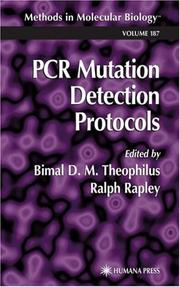
ISBN: 0896036170 0585403309 1592592732 9786610830589 1280830581 Year: 2002 Publisher: Totowa, NJ : Humana Press : Imprint: Humana,
Abstract | Keywords | Export | Availability | Bookmark
 Loading...
Loading...Choose an application
- Reference Manager
- EndNote
- RefWorks (Direct export to RefWorks)
Application of DNA technology to the identification of disease-causing mutations has become widespread in recent years. PCR Mutation Detection Protocols, provides biological and clinical investigators with a comprehensive collection of new, recent, and updated PCR-based screening methods suitable for detecting the presence of both known and novel mutations. The methods cover point mutations (e.g., ASO-PCR, SSCP, DGGE, chemical cleavage), deletions (multiplex PCR, FISH, blotting), non-sense mutations (PTT), and more. The new and exciting techniques of DNA array analysis, along with such recently developed experimental methods as conformation-sensitive gel electrophoresis, are also included. Additional coverage is given to the direct use of DNA sequencing as a detection method in its own right and to the characterization of mutations previously located by other screening techniques. Each chapter explains the basic theory behind the technique and provides valuable notes essential for its successful execution. Comprehensive and highly practical, PCR Mutation Detection Protocols assures both seasoned and novice investigators access to the highly productive and readily reproducible PCR-based mutation detection methods, techniques that are laying the groundwork for many of today's major scientific and medical advances.
Mutation (Biology) --- Polymerase chain reaction --- Genetics --- Variation (Biology) --- Cytology. --- Cell Biology. --- Cell biology --- Cellular biology --- Biology --- Cells --- Cytologists --- Polymerase Chain Reaction --- DNA Mutational Analysis --- Methods.
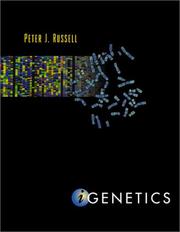
ISBN: 0805345531 0321181727 Year: 2002 Publisher: San Francisco (Calif.) : Benjamin/Cummings,
Abstract | Keywords | Export | Availability | Bookmark
 Loading...
Loading...Choose an application
- Reference Manager
- EndNote
- RefWorks (Direct export to RefWorks)
genetica --- genetische manipulatie --- genetische code --- dna --- genetische informatie --- Genetics --- Biology --- Embryology --- Mendel's law --- Adaptation (Biology) --- Breeding --- Chromosomes --- Heredity --- Mutation (Biology) --- Variation (Biology) --- Genetics.

ISBN: 0878937560 9780878937561 Year: 2002 Publisher: Sunderland Sinauer Associates
Abstract | Keywords | Export | Availability | Bookmark
 Loading...
Loading...Choose an application
- Reference Manager
- EndNote
- RefWorks (Direct export to RefWorks)
Animal genetics. Animal evolution --- Molecular biology --- Variation (Biology) --- Evolutionary genetics --- Variation (Biologie) --- Génétique évolutive --- 575.8 --- Evolution. Origin of species. Phylogeny --- Evolutionary genetics. --- Variation (Biology). --- 575.8 Evolution. Origin of species. Phylogeny --- Génétique évolutive --- Biological variation --- Biology --- Heredity --- Genetics --- Mutation (Biology) --- Genetic evolution --- Evolution (Biology)
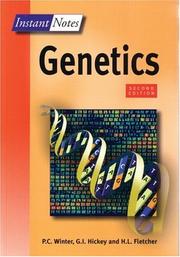
ISBN: 1859962629 Year: 2002 Publisher: Oxford BIOS scientific publ.
Abstract | Keywords | Export | Availability | Bookmark
 Loading...
Loading...Choose an application
- Reference Manager
- EndNote
- RefWorks (Direct export to RefWorks)
genetica --- Genetics --- Génétique --- Outlines, syllabi, etc. --- Handbooks, manuals, etc. --- Résumés, programmes, etc. --- Guides, manuels, etc. --- 575 --- General genetics. General cytogenetics. Immunogenetics. Evolution. Speciation. Phylogeny --- 575 General genetics. General cytogenetics. Immunogenetics. Evolution. Speciation. Phylogeny --- Génétique --- Résumés, programmes, etc. --- moleculaire biologie --- Molecular biology --- Biology --- Embryology --- Mendel's law --- Adaptation (Biology) --- Breeding --- Chromosomes --- Heredity --- Mutation (Biology) --- Variation (Biology)

ISBN: 0521781655 0521828422 9781139379533 1139379534 9781139375245 1139375245 9781139342179 1139342177 9781139376679 1139376675 9780521781657 9780521828420 9781107404182 1107404185 9781107404182 1107160286 9781107160286 1280647310 9781280647314 9786613633361 6613633364 1139378104 9781139378109 1139371258 9781139371254 9780511525728 9780521022132 Year: 2002 Volume: 3 Publisher: Cambridge Cambridge University Press
Abstract | Keywords | Export | Availability | Bookmark
 Loading...
Loading...Choose an application
- Reference Manager
- EndNote
- RefWorks (Direct export to RefWorks)
This book was first published in 2004. Unraveling the origin of biodiversity is fundamental for understanding our biosphere. This book clarifies how adaptive processes, rather than geographic isolation, can cause speciation. Adaptive speciation occurs when biological interactions induce disruptive selection and the evolution of assortative mating, thus triggering the splitting of lineages. Internationally recognized leaders in the field explain exciting developments in modeling speciation, together with celebrated examples of rapid speciation by natural selection. Written for students and researchers in biology, physics, and mathematics, this book is a groundbreaking treatment of modern speciation science.
Adaptation (Biology). --- Communicable Diseases. --- Drug Resistance, Microbial. --- Drug resistance in microorganisms. --- Microbial ecology. --- Microbial mutation. --- Microorganisms --- Mutation. --- Pathogenic microorganisms. --- Species. --- Virulence (Microbiology). --- Evolution. --- Adaptation (Biologie) --- Espèces (Biologie) --- Espèces (Biologie) --- Adaptation (Biology) --- Earth & Environmental Sciences --- Ecology --- Speciation (Biology) --- Biology --- Genetics --- Hybridization --- Organisms --- Environment --- Self-organizing systems --- Variation (Biology) --- Biological fitness --- Environmental adaptation --- Adaptation, Environmental
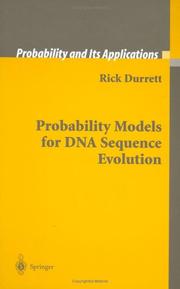
ISBN: 038795435X 1475762879 1475762852 Year: 2002 Publisher: New York : Springer,
Abstract | Keywords | Export | Availability | Bookmark
 Loading...
Loading...Choose an application
- Reference Manager
- EndNote
- RefWorks (Direct export to RefWorks)
How is genetic variability shaped by natural selection, demographic factors, and random genetic drift? To approach this question, we introduce and analyze a number of probability models beginning with the basics, and ending at the frontiers of current research. Throughout the book, the theory is developed in close connection with examples from the biology literature that illustrate the use of these results. Along the way, there are many numerical examples and graphs to illustrate the conclusions. This is the second edition and is twice the size of the first one. The material on recombination and the stepping stone model have been greatly expanded, there are many results form the last five years, and two new chapters on diffusion processes develop that viewpoint. This book is written for mathematicians and for biologists alike. No previous knowledge of concepts from biology is assumed, and only a basic knowledge of probability, including some familiarity with Markov chains and Poisson processes. The book has been restructured into a large number of subsections and written in a theorem-proof style, to more clearly highlight the main results and allow readers to find the results they need and to skip the proofs if they desire. Rick Durrett received his Ph.D. in operations research from Stanford University in 1976. He taught in the UCLA mathematics department before coming to Cornell in 1985. He is the author of eight books and 160 research papers, most of which concern the use of probability models in genetics and ecology. He is the academic father of 39 Ph.D. students and was recently elected to the National Academy of Science. .
Stochastic processes --- Mathematical statistics --- Genetics --- Nucleotide sequence --- Probabilities. --- Evolutionary genetics --- Variation (Biology) --- Génétique --- Séquence nucléotidique --- Probabilités --- Génétique évolutive --- Statistical methods. --- Méthodes statistiques --- Génétique --- Séquence nucléotidique --- Probabilités --- Génétique évolutive --- Méthodes statistiques --- Statistics . --- Biomathematics. --- Probability Theory and Stochastic Processes. --- Statistics for Life Sciences, Medicine, Health Sciences. --- Mathematical and Computational Biology. --- Biology --- Mathematics --- Statistical analysis --- Statistical data --- Statistical methods --- Statistical science --- Econometrics --- Probability --- Statistical inference --- Combinations --- Chance --- Least squares --- Risk

ISBN: 9780878932344 0878932348 Year: 2002 Publisher: Sunderland Sinauer Associates
Abstract | Keywords | Export | Availability | Bookmark
 Loading...
Loading...Choose an application
- Reference Manager
- EndNote
- RefWorks (Direct export to RefWorks)
Genome --- Genomics --- Gene Expression --- Polymorphism, Single Nucleotide --- Genomes --- Bioinformatics --- Genetics --- genetics --- Methodology --- 575 --- General genetics. General cytogenetics. Immunogenetics. Evolution. Speciation. Phylogeny --- Bioinformatics. --- Genetics. --- Genomes. --- Methodology. --- 575 General genetics. General cytogenetics. Immunogenetics. Evolution. Speciation. Phylogeny --- Genome research --- Molecular genetics --- Haploidy --- Biology --- Embryology --- Mendel's law --- Adaptation (Biology) --- Breeding --- Chromosomes --- Heredity --- Mutation (Biology) --- Variation (Biology) --- Bio-informatics --- Biological informatics --- Information science --- Computational biology --- Systems biology --- Research --- Data processing --- Polymorphism, Single Nucleotide - genetics --- Genomics - Methodology
Periodical
Abstract | Keywords | Export | Availability | Bookmark
 Loading...
Loading...Choose an application
- Reference Manager
- EndNote
- RefWorks (Direct export to RefWorks)
Genetics --- Cytogenetics --- Genomics --- Cell Biology. --- Genetics. --- Génétique --- Cytogénétique --- Génomique --- Cytogenetics. --- Genomics. --- Cytogenetik --- Genom --- Research --- Recherche --- Research. --- Cellular Biology --- Cytology --- Biologies, Cell --- Biologies, Cellular --- Biology, Cell --- Biology, Cellular --- Cell Biologies --- Cellular Biologies --- Zellgenetik --- Zytogenetik --- Genome research --- Genomes --- Genetic research --- Genetic Structures --- Genetic Phenomena --- Biology --- Embryology --- Mendel's law --- Adaptation (Biology) --- Breeding --- Chromosomes --- Heredity --- Mutation (Biology) --- Variation (Biology) --- Proteom --- Genetik --- Molecular genetics --- CYTOLOGY --- GENETICS --- PLANTS --- CHROMOSOMES --- PLANT GENETICS --- PLANT GENOMICS --- Citogenètica --- Genètica humana

ISBN: 0313012946 9780313012945 9780897898782 0897898788 9780897898799 0897898796 0897898788 0897898796 1280930411 9781280930416 9786610930418 6610930414 9798400637810 Year: 2002 Publisher: Westport, Conn. Bergin & Garvey
Abstract | Keywords | Export | Availability | Bookmark
 Loading...
Loading...Choose an application
- Reference Manager
- EndNote
- RefWorks (Direct export to RefWorks)
Human evolution. --- Evolution (Biology) --- Social evolution. --- Natural selection. --- Anthropology. --- Archaeology. --- Ethnoarchaeology. --- Ethnic archaeology --- Ethnicity in archaeology --- Ethnology in archaeology --- Archaeology --- Ethnology --- Social archaeology --- Archeology --- Anthropology --- Auxiliary sciences of history --- History --- Antiquities --- Human beings --- Darwinism --- Selection, Natural --- Genetics --- Variation (Biology) --- Biological invasions --- Heredity --- Cultural evolution --- Cultural transformation --- Culture, Evolution of --- Culture --- Evolution --- Social change --- Animal evolution --- Animals --- Biological evolution --- Evolutionary biology --- Evolutionary science --- Origin of species --- Biology --- Biological fitness --- Homoplasy --- Natural selection --- Phylogeny --- Physical anthropology --- Evolutionary psychology --- Methodology --- Origin --- Darwin, Charles, --- Darwin, Charles, Robert --- Contributions in archaeology. --- Primitive societies --- Social sciences
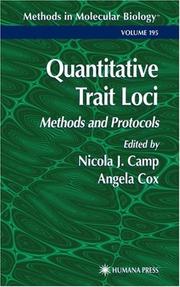
ISBN: 0896039277 9786610821389 1280821388 1592591760 Year: 2002 Publisher: Totowa, N.J. : Humana Press,
Abstract | Keywords | Export | Availability | Bookmark
 Loading...
Loading...Choose an application
- Reference Manager
- EndNote
- RefWorks (Direct export to RefWorks)
Statistical methods for the analysis of quantitative trait locus (QTL), in conjunction with genome-wide screening technologies, are today yielding exciting results in the study of human disease, experimental organisms, and agriculture. In Quantitative Trait Loci: Methods and Protocols, Drs. Nicola Camp and Angela Cox have assembled a highly experienced panel of statistical geneticists who demonstrate in a step-by-step fashion how to use this powerful methodology and associated software for the detection and fine mapping of quantitative trait loci. Writing for the nonmathematician, these experts guide the investigator from the design stage of a project onwards, providing detailed explanations of how best to proceed with each specific analysis, to find and use appropriate software, and to interpret results. Worked examples, citations to key papers, and useful variations and/or extensions to standard methods are included that ease the reader toward understanding and successful studies. Among the cutting-edge techniques presented are QTDT methods, variance components methods, and the Markov chain Monte Carlo method for joint linkage and segregation analysis. Up-to-date and highly practical, Quantitative Trait Loci: Methods and Protocols makes available to nonmathematical investigators a step-by-step guide to the productive use today of all the latest techniques for localizing genes involved in complex quantitative traits.
575.22 --- 616.8-056.7 --- 581.154 --- 575.17 --- 591.15 --- Genetics --- -Gene mapping --- Phenotype --- Phenotypes --- Genotype-environment interaction --- Chromosome mapping --- Genetic mapping --- Genome mapping --- Linkage mapping (Genetics) --- Mapping, Gene --- 591.15 Variation. Heredity --- Variation. Heredity --- 575.17 Population genetics. Genetic processes in populations --- Population genetics. Genetic processes in populations --- 581.154 Hereditary variations. Mutations. --- Hereditary variations. Mutations. --- 616.8-056.7 Hereditary, congenital nervous disorders. Genetic neuropathology --- Hereditary, congenital nervous disorders. Genetic neuropathology --- 575.22 Genotypic variation. Genotype --- Genotypic variation. Genotype --- Biology --- Embryology --- Mendel's law --- Adaptation (Biology) --- Breeding --- Chromosomes --- Heredity --- Mutation (Biology) --- Variation (Biology) --- Statistical methods --- Technique --- Gene mapping. --- Phenotype. --- Statistical methods. --- Gene mapping --- Hereditary variations. Mutations --- Human genetics. --- Human Genetics. --- Heredity, Human --- Human biology --- Physical anthropology
| Listing 1 - 10 of 13 | << page >> |
Sort by
|

 Search
Search Feedback
Feedback About UniCat
About UniCat  Help
Help News
News